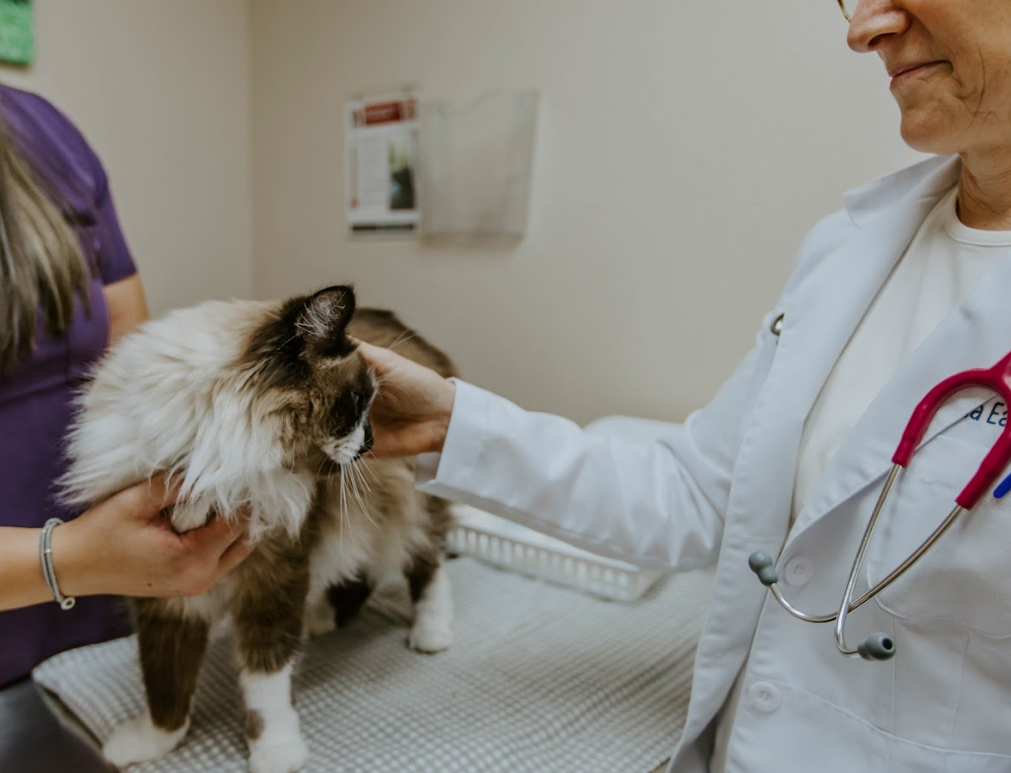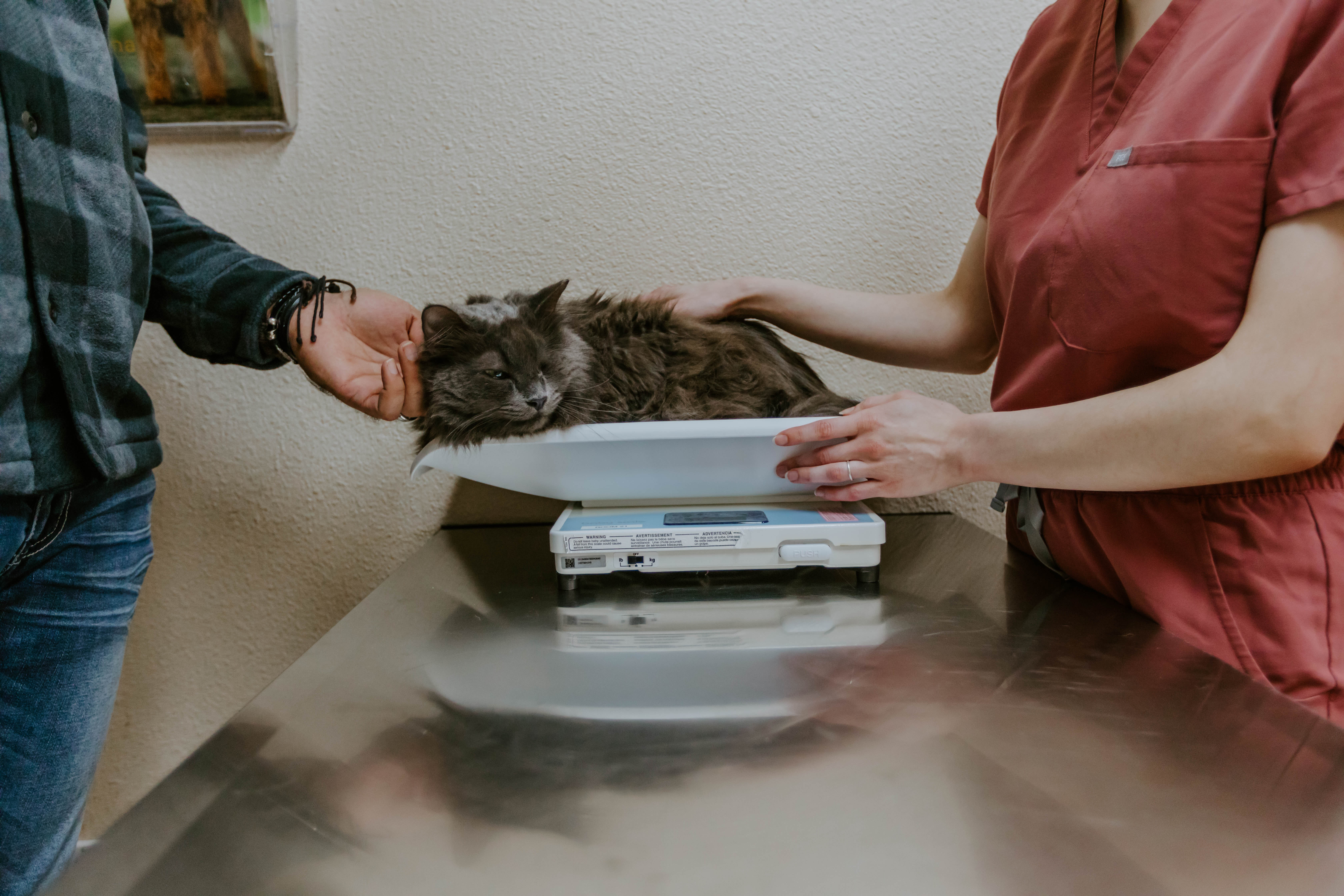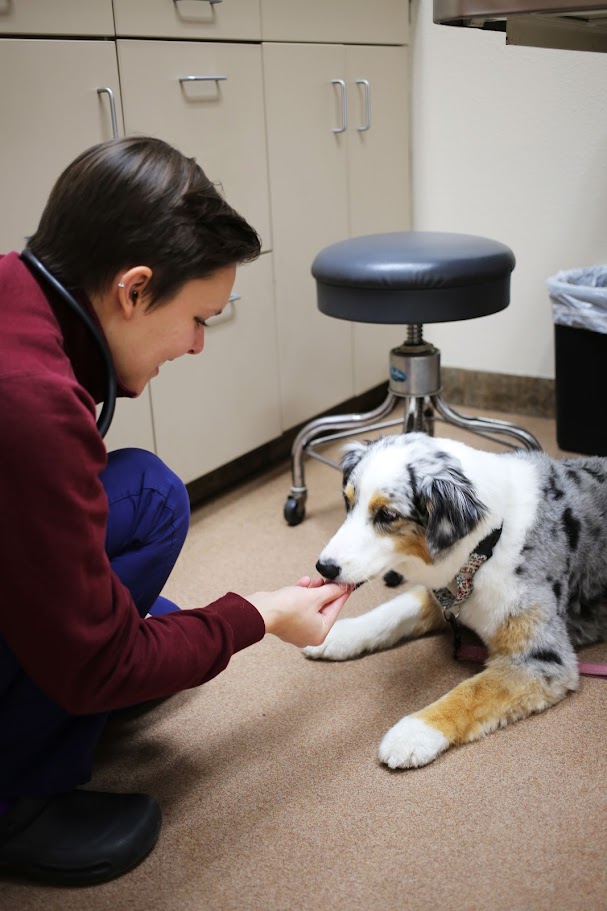Preventive and primary care is just as important for your pet as they are for you. This includes an annual physical exam, dental exam, eye exam, and maybe even a nutritional consultation.

The advantage of bringing your pet to a veterinarian annually is that your pet will have all aspects of their health examined in one visit -- as opposed to visiting numerous doctors as humans must do. We recommend your pet receive a physical exam every year so that we can spot any hidden health issues, or at the very least, obtain a health history and baseline information we can compare to and review in the coming years. For example, this will help us spot any changes in blood work, weight changes, or note any growths that may have developed.
During a physical examination, we will ask you questions about your pet's lifestyle such as: whether they spend most of their time indoors or outdoors, which food(s) they eat, how their activity and energy level are, etc. Then we'll do a thorough physical exam, including listening to your pet's heart and lungs, evaluating your pet's vision and looking in their ears, palpating their abdomen, checking the range of motion and assessing the health of their joints, looking for any unusual lumps, checking their reflexes, and evaluating the health of their teeth and gums.
If your pet is over seven he or she is considered a senior pet and we recommend a full blood panel to be proactive in catching diseases such as cancer, kidney, heart, and liver disease. The sooner these conditions are detected, the better the chance of effectively managing them.
Routine examinations give us an opportunity to develop a picture of your pet's overall health and for you to ask general or specific questions about your pet. Examinations are also essential in spotting problems before they become serious health issues and are also a good time for your pet to get up-to-date on his or her vaccinations.
The cost of an examination for your pet during regular business hours with a scheduled appointment is $84, recheck appointments are $65. Puppy and Kitten Appointments are $71. An estimate of additional costs will be provided to you at the time of your appointment.

Dental Health
Did you know periodontal disease is the most frequently diagnosed health problem for pets? By the age of three, 80% of dogs and 70% of cats have visible tartar and gingivitis.
Proper dental care helps pets maintain more than a nice smile and fresh breath: tooth and gum disease in pets is painful and may lead to other serious health problems, such as heart and kidney disease. Preventive care is key -- brushing your pet's teeth on a regular basis and having annual cleanings is one of the most important things you can do to help prevent dental disease and keep your pet healthy and happy.
At Bishop Ranch Veterinary Center & Urgent Care, we expertly perform complete dental cleanings for approximately 1,000 pets annually. Our digital dental radiograph (x-ray) unit has significantly improved our ability to identify fractured and abscessed teeth and the presence of tooth-root disease, thereby allowing earlier, easier (and less costly) treatments.
National Pet Dental Month
We are proud to participate in the annual National Pet Dental Awareness year-round by offering discounts on dental cleanings to our clients.
Dental Care Resources
Please call us for pet dental care costs.
Watch Dental Health Video

Microchipping
Each year, thousands of pets go missing, and many never find their way home. Implanting a microchip in your pet is a simple and virtually painless way to help avoid this tragedy.
A microchip is about the size and shape of a grain of rice. It is implanted beneath a pet's skin between the shoulder blades and stays there for the pet's entire life. This procedure is as easy and as painless as a vaccination.
Each microchip emits a unique number when a hand-held scanner is brought near. This number, along with information about the owner and pet, are added to a national pet registry. Most veterinary hospitals and animal shelters have electronic scanners for detecting and reading these implanted microchips. If a lost pet is found and a microchip is detected by scanning, the registry is called and the owner can be contacted.
Talk to your veterinarian about the Bishop Ranch Veterinary Center pet identification program. And while we recommend having your pet microchipped, we still advise that your pet also wears a collar with identification tags.
National Database
When was the last time you checked the national databases to be sure the information there for your pet was current? Here are two links to get you there.

Nutrition
You do it every day, but how much do you know about the food you feed your pets? A healthy diet for your pet is an essential part of their overall health care — just as it is for you.
Feeding your pet the proper diet is one of the easiest and most effective ways to help keep them healthy and active! Your pet's dietary and nutritional requirements will depend on their age, weight, lifestyle, and individual health concerns.
The two most common problems pets have as a result of their diet are obesity and food allergies. Obesity can contribute to the development of osteoarthritis, diabetes, heart disease, kidney disease and many forms of cancer. Pets with food allergies often suffer from itchy skin (around the face, feet, ears, armpits, and anus) and can develop chronic ear infections, hair loss, "hot spots" and skin infections.
At Bishop Ranch Veterinary Center & Urgent Care, our veterinarians will help you develop a nutrition plan that is right for your pet, providing a balanced diet consultations and holistic diet consultations.
We also carry a variety of specialty and prescription pet foods at The Pet Care Depot, located next door to our hospital.

Parasite Prevention
Any pet who spends time outdoors can become infested with internal or external parasites during their lifetime. If left untreated, parasites can affect your pet in a variety of ways, ranging from simple irritation to life-threatening conditions. Failing to give regular monthly preventive medications can expose your entire family to disease and subject your pets to potentially life-threatening conditions.
Important Facts About Parasites:
1 to 3 million people are infected with hookworm by their pets each year.
Fleas can give tapeworms to your pet, which can be transmitted to humans.
Tick bites can give your pet infections like Lyme disease which is transmittable to humans.
Raw meat can give animals parasites and carry bacteria that can make animals and humans sick.
The most common parasites transmittable to humans are tapeworms, roundworms, hookworms and whipworms.
Year-round prevention is the most effective way to control dog and cat parasites and the diseases they carry.
Parasite Prevention Recommendations
We are able to run heartworm and complete parasite screenings every day of the week, and can determine if you pet has heartworm, or other parasites. If you suspect your pet is carrying intestinal parasites (due to intermittent vomiting, diarrhea, or poor appetite), we also recommend you bring in a fecal sample at the time of your visit.
Dogs
If your dog is not taking a regular monthly parasite preventative (Heartgard, Sentinel, Tri-Heart, or Interceptor) then your dog should be tested for heartworms and intestinal parasites every 12 months.
Cats
We recommend that all cats who go outdoors be screened for intestinal parasites annually.
Fleas & Ticks
In addition to monthly parasite preventive medications, we also recommend your pet be on a monthly flea and tick preventive medication. Fleas and ticks can transmit tapeworms, Lyme disease, and other infections. We suggest talking with your veterinarian about an integrated flea and tick program to help you decide which medications are right for your pet.
Parasite Prevention Resources
What Every Pet Owner Should Know About Roundworms & Hookworms
Tick Borne Diseases
Protect your pet with prevention, early detection, and expert care.
Ticks are more than just a nuisance—they carry serious diseases that can affect your dog’s health. Common tick-borne illnesses in California include Lyme disease, Ehrlichiosis, Anaplasmosis, Rocky Mountain Spotted Fever, and others. These diseases often show subtle signs—or none at all—making prevention and routine screening essential.
Know the Signs
Symptoms can vary depending on the specific disease, but may include:
Fever or fatigue
Loss of appetite or weight
Joint stiffness or shifting-leg lameness
Vomiting or nosebleeds
Depression or weakness
Neck pain
If your dog has been exposed to ticks or is showing any of these signs, contact us right away for guidance or an appointment.
Prevention Is the Best Medicine
We offer a variety of safe, effective tick preventives including topicals, oral medications and tick collars. Year-round protection is strongly recommended in our region. Your veterinarian may also recommend the Lyme disease vaccine, depending on your dog’s lifestyle and risk factors.
Even with the best preventives, no method is 100% foolproof. That’s why daily tick checks and prompt removal are important—ticks must feed for several hours to transmit most diseases.
Need help with tick removal? We’re happy to assist—tick removals are free (appointment recommended), and we offer tick removal tools in our lobby.
Early Detection Saves Lives
We follow CAPC guidelines for annual vector-borne disease screening. With just a few drops of blood, we can test for:
Heartworm
Lyme disease
Ehrlichia
Anaplasma
These results are available in about 10 minutes during your visit.
Even if your dog is on year-round preventives, annual screening helps ensure their continued protection and may catch infections early—before they cause serious illness.
Stay Informed:
Check out real-time tick and parasite data in our area using the CAPC Interactive Map.
Pet Insurance
Bishop Ranch Veterinary Center & Urgent Care works with all pet insurance companies. Pet insurance gives you that peace of mind, so in the event of an emergency, or if any other unforeseen medical conditions arise, a portion of your pet's veterinary bill will be covered. Click Here to read more about how to invest in your pet's health with pet insurance.

Senior Pet Care
On average, animals age 5 to 8 times faster than humans. But just like their human companions, aging pets have the potential of facing life-threatening diseases that may include kidney, heart, and liver disease, weight and mobility changes, arthritis, cancer, and hormonal conditions like diabetes and thyroid disease.
That's why we recommend that dogs over the age of 7 and cats over the age of 10 receive a preventive health exam annually to detect, treat and prevent health problems before they become life-threatening. We believe it is far more important to screen pets for serious health problems ahead of time, rather than wait for obvious signs of illness to develop later.
Regular preventive health exams throughout a pet's lifespan will help us establish a baseline so we can track health changes as your pet ages. Senior preventive health exams include a complete physical exam, blood profile, and urinalysis. Depending on your pet's health and age, further testing may be recommended, such as an ultrasound or X-ray.
If your senior pet is exhibiting any of the following signs, please contact our office:
Increased or decreased water intake
Unexpected weight loss or weight gain
Mouth odor
Inflamed and irritated gums
Recurring vomiting or diarrhea
Difficulty rising, walking, running or jumping
Decreased exercise tolerance
Coughing or labored breathing
Lumps
Skin changes
Vision loss
Urine or fecal incontinence
Unusual changes in behavior
Senior Pet Resources

Spay & Neuter
Sadly, thousands of dogs and cats are euthanized every year in our local shelters, and nationwide the estimates range as high as 10 million dogs and cats euthanized in the United States annually.
Unless you have a pure-bred dog or cat specifically intended for breeding, your pet should be neutered or spayed before they have a chance to reproduce, which occurs about six months of age.
Spays and neuters are outpatient procedures, meaning your pet comes into the veterinary hospital for surgery and goes home the same day. Most pets return to their full activity level within a few days. The relative quickness and simplicity of the procedure, and the rapid recovery of most pets within a day or two means there is no reason a healthy dog or cat, puppy, or kitten should not be spayed or neutered.
Benefits of Spaying Your Pet (females)
No heat cycles (no vaginal bleeding, which usually lasts about two weeks)
Reduces the risk of mammary tumors and eliminates the risk of ovarian and uterine cancer
Reduces the number of unwanted kittens or puppies
Benefits of Neutering Your Pet (males)
Eliminates the risk of testicular cancer and reduces the risk of certain prostate diseases
Reduces urine marking and spraying
Reduces undesirable sexual behavior, such as roaming and mounting
Reduces the number of unwanted kittens or puppies
Altering your pet will increase his or her chances of living and enjoying a longer and healthier life. Spaying or neutering your pet will increase a dog's lifespan by an average of 1 to 3 years and will increase a cat's life by 3 to 5 years!

Vaccinations
Vaccines are critical in preventing Canine Distemper, Parvovirus, Bordetella, Rabies, and other diseases in your dog; and Feline Leukemia, Feline Distemper, Rabies and Upper Respiratory Infections in cats. There are even effective vaccinations that reduce the risk of death in dogs bitten by rattlesnakes. Our staff can assist you in deciding which preventative measures are necessary for your pet.
Up-to-date vaccinations play a large part in keeping your pet healthy and free from disease. However, not every pet requires the same series or frequency of vaccines. Our veterinarians will tailor a vaccine protocol that's specific to your pet based on his or her lifestyle. Vaccine schedules are balanced to provide needed protection while not over-vaccinating your pet.
What You Should Know about Vaccine Clinics
Some things to consider prior to taking your pet in for vaccines include where you take them. If you take your pet to low-cost vaccine clinics, it is important to realize that they will not give your dog a 3-year Distemper/Parvo injection. Rather they will only give your pet a 1-year vaccine and you will have to go back every year.
Vaccine clinics may also give vaccines that, in many cases, are not necessary (Coronavirus, Giardia, Lyme disease, Leptospirosis). When you bring your pet to Bishop Ranch Veterinary Center & Urgent Care, your pet will only be given the vaccines they need—and additionally, they will receive a comprehensive physical exam--and it may not cost any more than a vaccine clinic, where unnecessary vaccinations, that have to be repeated yearly, are given.
Pet Vaccine Reminders
As a client of Bishop Ranch Veterinary Center & Urgent Care, you will automatically receive pet vaccine reminders when your pet is due for their vaccine. If you would like to sign up for vaccine reminders via email, US mail, or phone, please let us know. Please send your request to: reminders@webvets.com
Vaccine Costs
Vaccinations for your dog or cat will vary depending on the vaccine being given and the frequency that it is needed. Most of our vaccines are between $28- 35 each, with a few vaccines for Rattlesnake or the Canine Flu costing $42-50. Unless you are otherwise informed by our staff all annual vaccinations require an examination with a veterinarian. Please do not hesitate for our staff to provide you an estimate of any services you are considering for your pet.
Important Information on Vaccinations

Puppy & Kitten Care
Whether you have just become a new "parent" to a puppy or kitten for the first time, or you're adding another to an already full house of pets, we're excited about helping you learn about raising your little one! We provide a puppy handbook copy just for you at the bottom.
At Bishop Ranch Veterinary Center & Urgent Care, we'll do far more than simply administer vaccinations. Throughout your puppy's or kitten's first few months you'll be able to see the same doctor at every visit who will monitor your pet's development, and you'll have an opportunity to ask questions about what behaviors are normal for a puppy or kitten (and how to keep them out of trouble!), or how and when proper training should begin.
We'll discuss with you which foods are best suited to your pet's breed and lifestyle, answer questions about how you can avoid common household hazards for pets, suggest simple ways to keep your pet's teeth clean (and breath fresh!), how to prevent "worms", and just pass along common-sense tips about raising a puppy or kitten that can only come from years of experience.
Providing the right "shots" for a puppy or kitten is important, but it is only one small part of raising a happy, healthy, and well-behaved pet and we pride ourselves on being an important resource for information on raising a puppy or kitten during this important, formative time in their lives.







